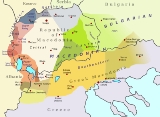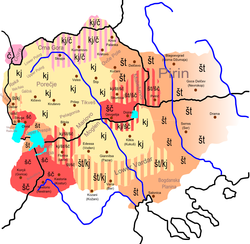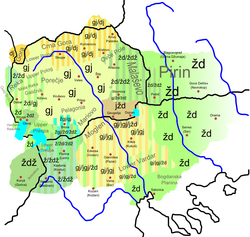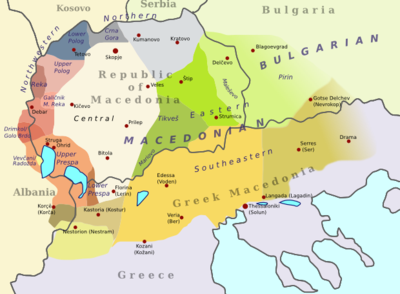
Dialects of the Macedonian language
Encyclopedia
The dialects of Macedonian comprise the Slavic dialects spoken in the Republic of Macedonia
as well as some varieties spoken in the wider geographic region of Macedonia
. They exist as part of the dialect continuum
of South Slavic languages
that joins the Macedonian language
with Bulgarian
to the east and Serbian
to the north. Prior to their codification
in 1945, Macedonian dialects were for the most part classified as Bulgarian.
After that the delimitation between this languages, especially with Bulgarian, is fleeting and controversial. Macedonian authors tend to treat all dialects spoken in the geographical region of Macedonia as Macedonian, including those spoken in the westernmost part of Bulgaria (so-called Pirin Macedonia), whereas Bulgarian authors treat all Macedonian dialects as part of the Bulgarian language. In Greece, the identification of the dialects spoken by the local Slavophone minority with either Bulgarian or Macedonian is often avoided, and these dialects are instead described simply as "Slavic", Dopia ('Local'), Stariski (old) or Našinski (ours).
The dialects of Macedonia in the wider sense can be divided into Eastern and Western groups (the boundary runs approximately from Skopje
and Skopska Crna Gora
along the rivers Vardar
and Crna), based on a large group of features. In addition, a more detailed classification can be based on the modern reflexes of the Proto-Slavonic reduced vowels ("yer
s"), vocalic sonorants and the back nasal (o). That classification distinguishes between the following 3 major groups::
Northern dialects
Western Dialects:
Eastern and Southern dialects
Most linguists classify the dialects in the Pirin (Blagoevgrad
) region of Bulgaria and in the far east of Greek Macedonia as Bulgarian, and the dialects in the rest of Greece and in Republic of Macedonia as Macedonian.

 As far as consonantal features are concerned, the entire Western region is distinguished from the East by loss of /x/ (except Tetovo
As far as consonantal features are concerned, the entire Western region is distinguished from the East by loss of /x/ (except Tetovo
, Gora and Korča) and the loss of /v/ in the intervocalic position (except Mala Reka and parts of Kostur-Korča): /ɡlava/ (head) = /ɡla/, /ɡlavi/ (heads) = /ɡlaj/. The Eastern region preserves /x/ (except Tikveš-Mariovo and Kumanovo-Kriva Palanka) and intervocalic /v/. The East is also characterised by the development of epenthetic /v/ before original /o/ where the West has epenthetic /j/: Eastern /vaɡlɛn/ (coal) but Western /jaɡlɛn/. The diphonemic reflexes are most characteristic of the dialects of Greek Macedonia and Blagoevgrad province
, Kostur-Korča and Ohrid
-Prespa
. The Serres - Nevrokop dialects
have a series of phonemically palatalised consonants.
and Albania
. The Eastern region, along with the neighbouring Bulgarian dialects, has various non-fixed stress systems. In Lower Vardar and Serres
-Nevrokop
unstressed /a, ɛ, ɔ/ are reduced (raised) to [ə, i, u]. The reduction of unstressed vowels (as well as the aforementioned allophonic palatalisation of consonants) is characteristic of East Bulgarian as opposed to West Bulgarian dialects, so these dialects are regarded by Bulgarian linguists as transitional between East and West Bulgarian.
Republic of Macedonia
Macedonia , officially the Republic of Macedonia , is a country located in the central Balkan peninsula in Southeast Europe. It is one of the successor states of the former Yugoslavia, from which it declared independence in 1991...
as well as some varieties spoken in the wider geographic region of Macedonia
Macedonia (region)
Macedonia is a geographical and historical region of the Balkan peninsula in southeastern Europe. Its boundaries have changed considerably over time, but nowadays the region is considered to include parts of five Balkan countries: Greece, the Republic of Macedonia, Bulgaria, Albania, Serbia, as...
. They exist as part of the dialect continuum
Dialect continuum
A dialect continuum, or dialect area, was defined by Leonard Bloomfield as a range of dialects spoken across some geographical area that differ only slightly between neighboring areas, but as one travels in any direction, these differences accumulate such that speakers from opposite ends of the...
of South Slavic languages
South Slavic languages
The South Slavic languages comprise one of three branches of the Slavic languages. There are approximately 30 million speakers, mainly in the Balkans. These are separated geographically from speakers of the other two Slavic branches by a belt of German, Hungarian and Romanian speakers...
that joins the Macedonian language
Macedonian language
Macedonian is a South Slavic language spoken as a first language by approximately 2–3 million people principally in the region of Macedonia but also in the Macedonian diaspora...
with Bulgarian
Bulgarian language
Bulgarian is an Indo-European language, a member of the Slavic linguistic group.Bulgarian, along with the closely related Macedonian language, demonstrates several linguistic characteristics that set it apart from all other Slavic languages such as the elimination of case declension, the...
to the east and Serbian
Serbian language
Serbian is a form of Serbo-Croatian, a South Slavic language, spoken by Serbs in Serbia, Bosnia and Herzegovina, Montenegro, Croatia and neighbouring countries....
to the north. Prior to their codification
Codification (linguistics)
In linguistics, codification is the process of standardizing and developing a norm for a language.Codifying a language can vary from case to case and depends on the stage of standardization that already exists...
in 1945, Macedonian dialects were for the most part classified as Bulgarian.
After that the delimitation between this languages, especially with Bulgarian, is fleeting and controversial. Macedonian authors tend to treat all dialects spoken in the geographical region of Macedonia as Macedonian, including those spoken in the westernmost part of Bulgaria (so-called Pirin Macedonia), whereas Bulgarian authors treat all Macedonian dialects as part of the Bulgarian language. In Greece, the identification of the dialects spoken by the local Slavophone minority with either Bulgarian or Macedonian is often avoided, and these dialects are instead described simply as "Slavic", Dopia ('Local'), Stariski (old) or Našinski (ours).
The dialects of Macedonia in the wider sense can be divided into Eastern and Western groups (the boundary runs approximately from Skopje
Skopje
Skopje is the capital and largest city of the Republic of Macedonia with about a third of the total population. It is the country's political, cultural, economic, and academic centre...
and Skopska Crna Gora
Skopska Crna Gora
Skopska Crna Gora , formerly called Kara-dagh also called simply Crna Gora, is a mountain range on the border between Kosovo and the Republic of Macedonia, between the cities of Kačanik and Skopje.The Monastery of St...
along the rivers Vardar
Vardar
The Vardar or Axios is the longest and major river in the Republic of Macedonia and also a major river of Greece. It is long, and drains an area of around . The maximum depth of river is ....
and Crna), based on a large group of features. In addition, a more detailed classification can be based on the modern reflexes of the Proto-Slavonic reduced vowels ("yer
Yer
The letter yer of the Cyrillic alphabet, also spelled jer or er, is known as the hard sign in the modern Russian and Rusyn alphabets and as er golyam in the Bulgarian alphabet...
s"), vocalic sonorants and the back nasal (o). That classification distinguishes between the following 3 major groups::
Dialects
 |
|
| Dialect divisions of Macedonian | |
Northern Western/Northwestern |
Eastern Southeastern Southwestern |
Northern dialects
- Western group:
- Lower Polog dialectLower Polog dialectThe Lower Polog dialect is a member of the western subgroup of the Northern group of dialects of the Macedonian language. It is spoken by the population in north-western Republic of Macedonia. This dialect is spoken in the city Tetovo, in the bigger villages Jegunovce, Vratnica, Tearce, Lešok,...
- Skopska Crna Gora dialectSkopska Crna Gora dialectThe Skopska Crna Gora dialect is a member of the western subgroup of the northern group of dialects of the Macedonian language. The dialect is spoken on small territory northern of Skopje on the mountain Skopska Crna Gora. The name of the dialect is derived from the name of the mountain because...
- Eastern group:
- Kumanovo dialectKumanovo dialectThe Kumanovo dialect is a member of the eastern subgroup of the Northern group of dialects of the Macedonian language. It belongs to the so called Prizren-Timok dialects, also known as Torlakian. The dialect is typical for the northern dialect of the Macedonian language and is very well known...
- Kratovo dialect
- Kriva Palanka dialectKriva Palanka dialectThe Kriva Palanka dialect is a member of the eastern subgroup of the northern group of dialects of the Macedonian language. This dialect is spoken mainly in the city of Kriva Palanka and surrounding villages.-Phonological characteristics:...
- Ovče Pole dialect
Western Dialects:
- Central group:
- Prilep-Bitola dialectPrilep-Bitola dialectThe Prilep-Bitola dialect is a member of the central subgroup of the western group of dialects of the Macedonian language. This dialect is spoken in much of the Pelagonia region , as well as by the Macedonian-speaking minority population in and around Florina in neighbouring Greek Macedonia...
- Kičevo-Poreče dialectKicevo-Porece dialectThe Kičevo-Poreče dialect is a member of the central subgroup of the western group of dialects of the Macedonian language. The dialect is spoken in a vast area in the Republic of Macedonia and mainly in the cities Kičevo and Makedonski Brod. It is also native to the villages of the region Porečje,...
- Skopje-Veles dialectSkopje-Veles dialectThe Skopje-Veles dialect is a member of the central subgroup of the Western group of dialects of the Macedonian language. The dialect is spoken by a larger group of people in the cities Skopje and Veles and in the surrounding villages: Volkovo, Katlanovo, Petrovec and Čaška among others...
- Western and north western group:
- Upper Polog dialectUpper Polog dialectThe Upper Polog dialect is a member of the western and north western subgroup of the western group of dialects of the Macedonian language. The dialect is mainly spoken in the area around the city of Gostivar to the villages Brvenica and Bogovinje on north, Reka region on west, Porčie on east and...
- Reka (torbeš) dialectReka dialectThe Reka dialect is a member of the west and north-west subgroup of the western group of dialects of the Macedonian language. The dialect is mainly spoken on the territory of the region Reka in north-western Macedonia. The Reka dialect is very close with the Galičnik and the Debar dialects...
- Galιčnik (malorekanski or Mala Reka) dialectGalicnik dialectThe Galičnik dialect or Mala Reka dialect is a member of the subgroup of western and north western dialects of the western group of dialects of the Macedonian language. The dialect is spoken on small territory on the mountain Bistra in western part of the Republic of Macedonia. The name of the...
- Debar dialectDebar dialectThe Debar dialect is a member of the subgroup of the western and north-western dialects of the western group of dialects of the Macedonian language. The dialect is mainly spoken in the city of Debar and the surrounding areas in Macedonia. The Debar dialect is closed with the Reka dialect and the...
- Drimkol-Golo Brdo dialect
- Vevčani-Radοža dialect
- Struga dialectStruga dialectThe Struga Dialect is a member of the western and north western subgroup of the western group of dialects of the Macedonian language. The dialect is spoken in Struga, Pogradec, Pustec and up to the Golo Brdo and in the surrounding hinterland...
- Ohrid dialectOhrid dialectThe Ohrid dialect is a member of the western and north western subgroup of the western group of dialects of the Macedonian language. The dialect is spoken in the region around the city Ohrid up to the southern point of the Ohrid Lake. Except in the city of Ohrid, the dialect is spoken in the...
- Upper Prespa dialectUpper Prespa dialectThe Upper Prespa dialect is a member of the western subgroup of the western group of dialects of the Macedonian language. The dialect is spoken in the town of Resen and surrounding areas...
- Lower Prespa dialectLower Prespa dialectThe Lower Prespa dialect , is a member of the western subgroup of the western group of dialects of the Macedonian language. This dialect is mainly spoken on the Eastern shore of Prespa Lake and Small Prespa Lake, both in the Republic of Macedonia and by the Slavic-speaking community on the Greek...
Eastern and Southern dialects
- Eastern group:
- Tikveš-Mariovo dialect
- Štip-Strumica dialect
- Maleševo-Pirin dialectMaleševo-Pirin dialectThe term Maleševo-Pirin dialect is used in South Slavic linguistics to refer to a group of related varieties that are spoken on both sides of the border between Bulgaria and the Republic of Macedonia. Some linguists treat them as dialects of the Bulgarian diasystem. while Victor Friedman views...
- South-western group:
- Nestram-Kostenar dialectNestram-Kostenar dialectThe Nestram-Kostenar dialect is a Macedonian Slavic dialect spoken in parts of northwestern Greece, in the area around the village of Nestorio and the area known as Kostenarija, which encompasses most of the Nestorio municipality as well as in the Akrites region...
- Korča (Gorica) dialect
- Kostur dialectKostur dialectThe Kostur dialect , is a member of the South-Western subgroup of the Southern group of dialects of the Macedonian language. This dialect is mainly spoken in and around the town of Kastoria, known locally in Macedonian as Kostur, and in the surrounding Korešta region which encompasses most of the...
- South-eastern group:
- Solun-Voden dialectSolun-Voden dialectThe Solun-Voden dialect, Lower Vardar dialect, or Kukush-Voden dialect is a South Slavic dialect spoken in parts of the Greek periphery of Central Macedonia, and the vicinity of Gevgelija and Dojran in the Republic of Macedonia...
- Ser-Drama-Lagadin-Nevrokop dialectSer-Drama-Lagadin-Nevrokop dialectThe Ser-Drama-Lagadin-Nevrokop dialect is a transitional South Slavic dialect which belongs to both the southeastern group of Bulgarian language, and the southeastern subgroup of dialects of the Macedonian language....
Most linguists classify the dialects in the Pirin (Blagoevgrad
Blagoevgrad Province
Blagoevgrad Province , also known as Pirin Macedonia , is a province of southwestern Bulgaria. It borders four other Bulgarian provinces to the north and east, Greece to the south, and the Republic of Macedonia to the west. The province has 14 municipalities with 12 towns...
) region of Bulgaria and in the far east of Greek Macedonia as Bulgarian, and the dialects in the rest of Greece and in Republic of Macedonia as Macedonian.
Variation in consonants


Tetovo
Tetovo is a city in the northwestern part of Macedonia, built on the foothills of Šar Mountain and divided by the Pena River.The city covers an area of at above sea level, with a population of 86,580 citizens in the municipality. Tetovo is home to the State University of Tetovo and South East...
, Gora and Korča) and the loss of /v/ in the intervocalic position (except Mala Reka and parts of Kostur-Korča): /ɡlava/ (head) = /ɡla/, /ɡlavi/ (heads) = /ɡlaj/. The Eastern region preserves /x/ (except Tikveš-Mariovo and Kumanovo-Kriva Palanka) and intervocalic /v/. The East is also characterised by the development of epenthetic /v/ before original /o/ where the West has epenthetic /j/: Eastern /vaɡlɛn/ (coal) but Western /jaɡlɛn/. The diphonemic reflexes are most characteristic of the dialects of Greek Macedonia and Blagoevgrad province
Blagoevgrad Province
Blagoevgrad Province , also known as Pirin Macedonia , is a province of southwestern Bulgaria. It borders four other Bulgarian provinces to the north and east, Greece to the south, and the Republic of Macedonia to the west. The province has 14 municipalities with 12 towns...
, Kostur-Korča and Ohrid
Ohrid
Ohrid is a city on the eastern shore of Lake Ohrid in the Republic of Macedonia. It has about 42,000 inhabitants, making it the seventh largest city in the country. The city is the seat of Ohrid Municipality. Ohrid is notable for having once had 365 churches, one for each day of the year and has...
-Prespa
Prespa
Prespa is a region in Republic of Macedonia. It shares the same name with the two Prespa lakes which are situated in the middle of the region. The largest town is Resen with 9,000 inhabitants....
. The Serres - Nevrokop dialects
Ser-Drama-Lagadin-Nevrokop dialect
The Ser-Drama-Lagadin-Nevrokop dialect is a transitional South Slavic dialect which belongs to both the southeastern group of Bulgarian language, and the southeastern subgroup of dialects of the Macedonian language....
have a series of phonemically palatalised consonants.
Variation in word stress and its effects on vowels
The Western dialects generally have fixed stress, antepenultimate in the Republic of Macedonia, and penultimate in GreeceGreece
Greece , officially the Hellenic Republic , and historically Hellas or the Republic of Greece in English, is a country in southeastern Europe....
and Albania
Albania
Albania , officially known as the Republic of Albania , is a country in Southeastern Europe, in the Balkans region. It is bordered by Montenegro to the northwest, Kosovo to the northeast, the Republic of Macedonia to the east and Greece to the south and southeast. It has a coast on the Adriatic Sea...
. The Eastern region, along with the neighbouring Bulgarian dialects, has various non-fixed stress systems. In Lower Vardar and Serres
Serres, Greece
Sérres is a city in Macedonia, Greece. It is situated in a fertile plain at an elevation of about 70 m, some 24 km northeast of the Strymon river and 69 km north-east of the Macedonian capital, Thessaloniki. The Rhodope Mountains rise to the north and east of the city...
-Nevrokop
Gotse Delchev (town)
Gotse Delchev , is a town in Blagoevgrad Province of Bulgaria with a population of 23,573.In 1951 the town was renamed after the Bulgarian revolutionary Georgi Nikolov Delchev. It had hitherto been called Nevrokop ....
unstressed /a, ɛ, ɔ/ are reduced (raised) to [ə, i, u]. The reduction of unstressed vowels (as well as the aforementioned allophonic palatalisation of consonants) is characteristic of East Bulgarian as opposed to West Bulgarian dialects, so these dialects are regarded by Bulgarian linguists as transitional between East and West Bulgarian.

